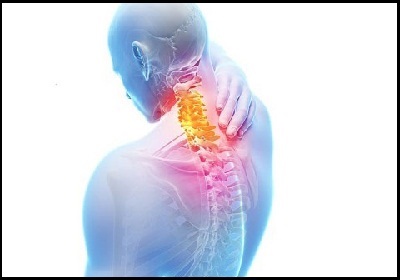
Spinal infections are rare infections that can involve the intervertebral disc space, the vertebral bones, the spinal canal, or adjacent soft tissues. Discitis refers to an infection of the intervertebral disc in the spine. Osteomyelitis refers to an infection of the vertebral bones in the spine. Infection may be caused by bacteria or fungal organisms, viruses, or can occur after a spinal procedure or surgery.
Generally, infections are bacterial and spread to the spine through the bloodstream. Bacteria may spread through the bloodstream into the vertebral discs and affect this area causing discitis. As the infection progresses, the disc space degenerates. As the disc decays, the infection may spread into the vertebral bodies above and below the disc called osteomyelitis. The bone, weakened by infection may also begin to collapse or crumble causing spinal deformity. In some cases the infection or crumbling bones may push into the area for the nerves or spinal cord which may cause neurologic symptoms including numbness, weakness, tingling, pain, or bowel or bladder dysfunction.
CAUSES
Conditions that weaken the immune system may predispose patients to spinal infection. These conditions include: diabetes mellitus, use of immunosuppressant medications cancer, malnutrition, history of organ transplant, and use of intravenous drug abuse. The most common organism in spinal infection is from the bacteria Staphylococcus aureus which typically exists on human skin, followed by Escherichia coli. Most spine infections occur in the lumbar spine because of the blood supply to this region of the spine. This may be seeded from a pelvic infection, urinary or bladder infection, pneumonia, or a soft-tissue infection. Infections associated with intravenous drug abuse are more likely to involve the neck or cervical spine. Infection from tuberculosis is rare in North America but when present is most commonly found in the thoracic spine.
SYMPTOMS
Unfortunately, spinal infections in adults have a slow, insidious onset with minimal symptoms which may delay diagnosis. Some patients experience symptoms for a number of weeks or months prior to being diagnosed. Symptoms often start with localized tenderness to the neck or back; pain is worsened with movement without relief from traditional rest and medications. Symptoms from overall infection may include fevers, chills, night pain, or unexplained weight loss however these are not common especially in chronically ill patients. Patients eventually develop severe back pain with limited movement. Although rare, discitis can also occur following spinal surgery. In postoperative patients, symptoms usually begin days to weeks after surgery. If spinal infection is suspected, laboratory evaluation and radiographic imaging studies are necessary.